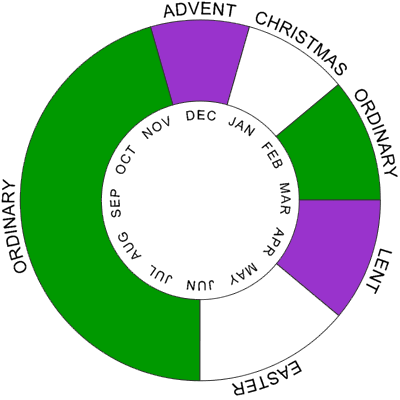
Increasingly, I am noticing people’s decreasing vocabulary. In Advent, with young people, I recently had to go through the meaning of words in “O Come, O Come, Emmanuel”. Obviously, the word “Emmanuel” needed some unpacking, but many, many did not know what “ransom”, “captive”, or “exile” meant…
“Common” can mean ordinary, frequent, course, ordinary…. But when we speak of “common prayer”, we are using “common” to mean “the same thing”: these four houses hold the lawn mower in common; they have one thing in common… Common prayer means a community praying together, two or more people praying as a group – not individually… Common prayer means reading the same readings, praying the same collect,… even when doing so in different locations, or even at different times of the day…
“Ordinary Time” does not mean “everyday” Time – “ordinary” here is connected to the word “ordinal” numbers, counting numbers, and to the word “ordered”, as in: lining things up in order.
Before Vatican II, there were Sundays after Epiphany and Sundays after Trinity. Vatican II came up with a new system for organising the calendar and lectionary: start reading systematically on the Sunday that falls between 7 and 13 January, stop on Ash Wednesday, and start again after the Easter Season until Advent. It counted those 34 possible weeks as “Tempus Per Annum”.
Now, in English, we are perfectly comfortable to use Latin phrases such as et cetera, ad hoc, or alter ego… but somehow “Tempus Per Annum” is too much of a mouthful, “time during (or through) the year” didn’t make it, and the obscure “Ordinary Time” won (obscure because it’s not ordinary “ordinary”, it’s counting-as-in-‘ordinal numbers’ “ordinary”!).
In 2021, there are 6 Ordinary Weeks prior to Ash Wednesday. There are only 52 weeks in this liturgical year. There is room in the system for the occasion when there are 53 weeks in a particular Church Year, so one week, Week 7, is dropped this year. And so, the week following the Day of Pentecost is Week 8. The next week, following Trinity Sunday, is Week 9. And, sure enough, the next Sunday (check if you like) is the “10th Sunday in Ordinary [that is “counting”] Time”.
The Church of England, more recently, came up with its own liturgical Brexit. It would start its “Ordinary Time” (no Latin there, thank you very much, that’s the Church of England!) in February rather than January.
NZ Anglicanism followed the wider Western church’s “Ordinary Time” numbering. But then, in a hankering after mother England, suddenly our church made “Ordinary Time” start in February. BUT – and here’s where NZ Anglicanism shows its creative uniqueness – we, here downunder, would call our first Sunday in February’s starting of Ordinary Time “The 4th (or even, as in this year, 5th – remember this is the Anglican Church of Or) Sunday in Ordinary Time”.
So, in NZ Anglicanism, there is no 1st, 2nd, nor 3rd Sunday in Ordinary Time – we leap straight in with “The 4th (or 5th) Sunday in Ordinary Time”.
The first Sunday in NZ Anglicanism’s Ordinary Time is “The Fourth Sunday in Ordinary Time” or “The Fifth Sunday in Ordinary Time”. Only in NZ Anglicanism!
Check this out on page 627 of A New Zealand Prayer Book He Karakia Mihinare o Aotearoa 2020 (NZPB2020). You won’t find a 1st, 2nd, nor 3rd Sunday in Ordinary Time there! In fact you won’t even find a “Fourth Sunday in Ordinary Time” in that book – something we needed in 2019 (check the 2019 lectionary for yourself if you don’t believe me).
Here’s NZ Anglicanism’s unique sequence:
10 Jan: 1st Sunday of [the] Epiphany (“the” is in the Lectionary booklet but not in NZPB2020)
17 Jan: 2nd Sunday of the Epiphany
24 Jan: 3rd Sunday of the Epiphany
31 Jan: 4th Sunday of the Epiphany
Or The Presentation of Jesus in the Temple
2 Feb: The Presentation of Jesus in the Temple
beginning of NZ Anglican Ordinary Time
7 Feb: 5th Sunday in Ordinary Time
I’m not even sure why we need these esoteric, badly-translated-from-the-Latin titles for these 34 Sundays and weekdays Tempus Per Annum. Why not simply refer to Sunday the 17th of January 2021? But that, my friends, would (obviously for some people) make religion, spirituality, and liturgy far too down to earth (too incarnational!), too ordinary (see what I did there?), too common! And, surely, if liturgy is to be liturgy it has to be arcane… beyond the easy accessibility of ordinary, common people…
*****
Whether you regard the Christmas Season as concluding on Christmas Day, Epiphany, the Baptism of the Lord, Candlemas, the Sunday following Candlemas, or are Orthodox, or Armenian, and celebrate the Incarnation on another day and see the season differently… in the Southern Hemisphere, and certainly in Aotearoa-New Zealand, this is our go-slow time… posts may be less frequent than usual. Use the search box to find things of interest. Do check out:
Liturgy’s Twitter profile
Liturgy’s Facebook page
Liturgy’s RSS Feed
Liturgy is also on Instagram.
You can also sign up for a not-very-often email, …


